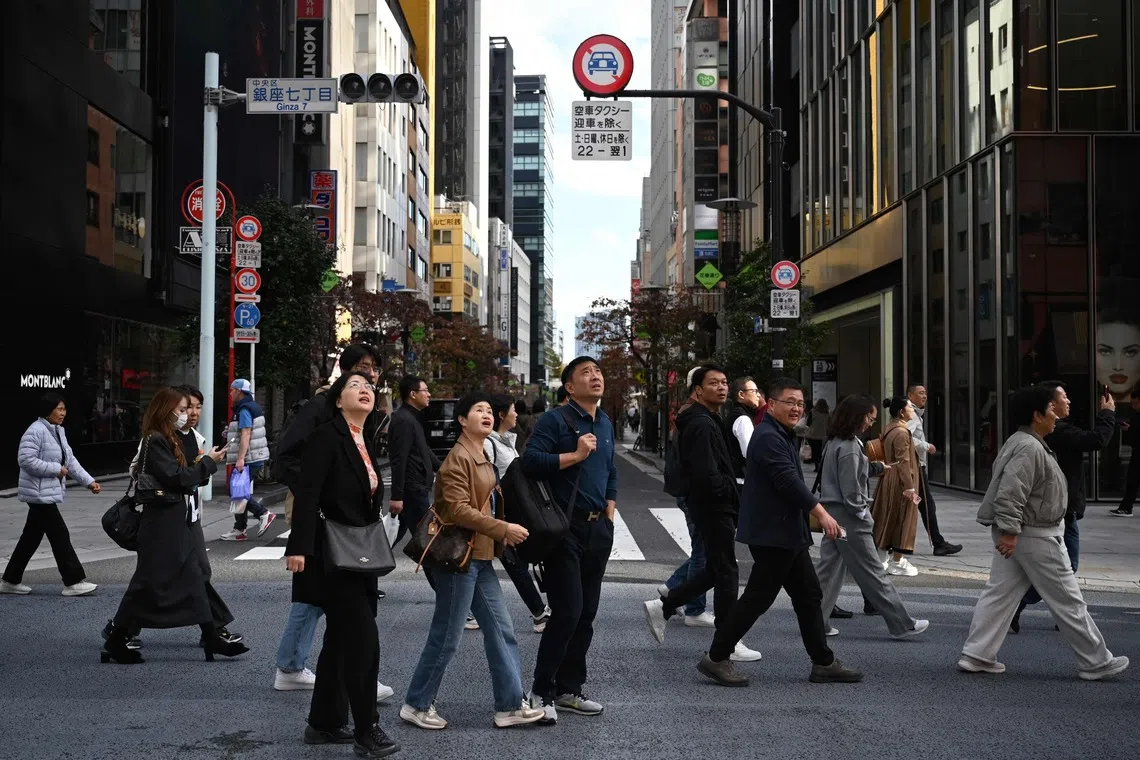China urges citizens to reconsider studying in Japan amid diplomatic row
Sign up now: Get insights on Asia's fast-moving developments

A Chinese tour group at Tokyo's Ginza shopping district on Nov 16.
PHOTO: AFP
TOKYO - The Chinese government on Nov 16 urged its citizens to carefully reconsider studying in Japan, citing safety risks, amid a bilateral diplomatic row over Japanese Prime Minister Sanae Takaichi’s recent comments on Taiwan.
The move is seen as part of Beijing’s response to Ms Takaichi’s recent remarks
On Nov 14, China also urged its citizens to avoid visiting Japan.
Public security in Japan has deteriorated in recent months, the Chinese government said in a statement, claiming a rise in criminal activities targeting Chinese nationals indicates they are less safe in Japan.
China’s Education Ministry also called on Chinese students already in Japan, as well as those planning to study there in the future, to closely monitor the security situation, strengthen their risk assessments and be more aware of personal safety.
As at May 2024, a total of 123,485 Chinese students were enrolled in universities and other educational institutions in Japan, including Japanese language schools, according to a survey by the government-linked Japan Student Services Organisation.
In a related move, the Hong Kong government issued a warning for Japan-bound travellers on Nov 15, citing “an increasing trend of attack incidents against Chinese citizens in Japan” since mid-2025.
The Chinese special administrative region reminded residents who intend to visit Japan or are already there “should exercise caution, attend to personal safety, pay attention to local announcements on the latest situation”.
According to Japan Tourism Agency data, visitors from Hong Kong amounted to some 2.68 million in 2024, ranking fifth by country or region.
Earlier in November, Ms Takaichi said a Taiwan emergency involving the use of military force could pose a “survival-threatening situation” for Japan under its security legislation.
The law, if certain conditions are met, allows Japan to exercise the right of collective self-defence.
Mr Takahide Kiuchi, executive economist at the Nomura Research Institute, estimated that mainland China’s latest travel alert could cause economic damages of 2.2 trillion yen (S$18.5 billion) to Japan.
At a Beijing airport on Nov 16, a Chinese man set to board a flight to Narita, near Tokyo, said he plans to shorten his Japan trip following the government’s travel warning. But some other travellers did not mind the safety alert.
Chinese state-run media have repeatedly criticised Ms Takaichi, a staunch conservative and reputed China hawk who became Japan’s first female leader late in October, for her national security policy.
In a commentary on Nov 16, the official Xinhua News Agency said Ms Takaichi’s “extremely erroneous and hostile remarks” on China have raised global alarm that she is leading Japan “on a course to reviving its notorious militarist past”.
Claiming her “fallacies” regarding China are part of a broader agenda to accelerate renewed militarism, the news agency said: “Behind these fallacies lie the paranoia and arrogance of Japanese right-wing forces seeking to break free from the country’s peace constitution and pursue the status of a ‘military power’.”
A social media account related to state-run China Central Television on Nov 15 introduced views of some Japan experts in China who suggested Beijing will likely take further countermeasures, such as adding Japanese politicians to its sanctions list, halting intergovernmental exchanges and taking military actions. KYODO NEWS


